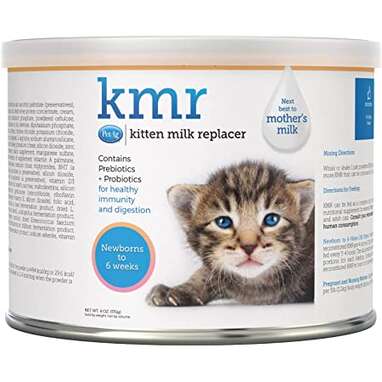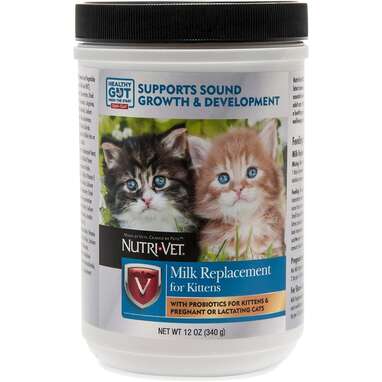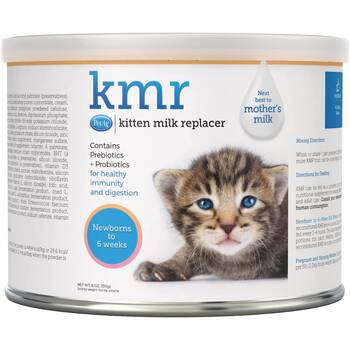Everything You Need To Know Before Buying Kitten Formula
Homemade may not be the way to go.

If you’ve taken on the role of cat parent to a newborn kitten, then you’re probably on the hunt for kitten formula since your new baby is much too little to begin eating solid or wet food.
But what exactly is kitten formula, and does it have to be store-bought? Or can it be made at home with things you already have in your refrigerator?
We talked to two vets who explained the ins and outs of kitten formula and why making your own formula at home is probably not the best idea. According to the experts, a good-quality kitten formula will be formulated with the same nutrients, vitamins and minerals that are found in mother’s milk.
- Best overall kitten formula: PetAg KMR
- Best kitten formula for sensitive stomachs: PetAg PetLac
- Best value kitten formula: Hartz Kitten Milk Replacer
- Best easy-to-mix kitten formula: Nutri-Vet Milk Replacement
- Best liquid kitten formula: PetAg PetLac Liquid
What is kitten formula, and when should it be used?
Kitten formula, sometimes called kitten milk replacer, is a substitute for mother’s milk.
“Newborn kittens get their nutrients by nursing from their mother, and a kitten milk replacer may be used when the kitten is separated from the mother before they are weaned (orphaned),” Dr. Callie Harris, a vet working with Purina, told The Dodo. Formula can also be used to feed kittens who have been rejected by their mother for one reason or another.
Then, once the kitten is about 3 or 4 weeks old, you can begin to wean her off the formula and introduce her to more solid foods like wet kitten food.
Homemade kitten formula vs. store-bought
If you haven’t consulted your vet about making kitten formula at home, then it’s recommended you stick to a store-bought option, as these formulas are made to match mother’s milk and contain all the vital nutrients a kitten needs to grow strong.
“Most veterinarians do not recommend that owners create their own kitten [formula] at home,” Dr. Carling Matejka, a veterinarian working with Solid Gold, told The Dodo. “Kitten diets need a precise ratio of minerals, vitamins, carbohydrates, protein and fat for the kitten to develop into a healthy adult cat.”
Dr. Matejka said that nutritional deficiencies can have lifelong, and sometimes deathly, effects on a young kitten, “so it is best to stick to a nutritionally balanced, commercial diet.”
“Store-purchased diets have many advantages, including being nutritionally balanced for growth, being [shelf]-stable, palatable, easy and cost-effective,” she continued.
But, if you’re interested in how to formulate kitten milk replacer at home, “it is highly recommended to book a consult with a board-certified veterinary nutritionist so they can formulate a specific diet that is balanced and safe for kittens,” Dr. Matejka said.
What to look for when buying kitten formula
There are a few shopping considerations to be aware of when buying milk replacer.
Powder vs. liquid
When shopping for the best formula for your kitten who has yet to be weaned, you’ll first want to decide if you’d rather buy powder formula and mix your own milk replacer or if you’d rather buy liquid formula. Both will need to be warmed before serving, and despite the latter being in liquid form, it needs to be shaken well before it’s warmed and bottled.
Opened powder mix is shelf-stable for three months and can be frozen for up to six months, whereas opened liquid formula only lasts 14 days, so keep this in mind before you buy.
Formula feeding equipment
You’ll also need to have syringes or bottles on hand if you’re feeding your kitten milk replacer. Depending on her age, your kitten may take better to a nippled syringe rather than a bottle, so it may be a good idea to pick up a variety pack like the one below to ensure your kitten will take to one type of bottle or the other as well as be served the right amount.
The best kitten formula you can buy
Based on guidance and recommendations from Drs. Harris and Matejka, and reviews from pet parents, these are some of the best kitten formulas you can buy.

Dr. Harris mentioned KMR as a great commercial brand to buy if you’re in need of kitten formula. It has an average 4.8-star rating and over 6,000 reviews because it’s easy for kitten caretakers to use. The packaging gives detailed instructions about how much and when to feed your kitten, and the ingredients label is clear and breaks down all the vitamins, nutrients and minerals the powdered product contains, which include all the important things you’d find in mother’s milk.

Another trusted formula is PetLac from PetAg. It’s an easy-to-digest formula that comes in powder form and contains all the necessary ingredients kittens need to grow healthy and strong. It can also be fed to pregnant and nursing cats to give their mother’s milk an extra boost of nutrition. Some pet parents write that PetLac was a lifesaver after their kittens experienced diarrhea when drinking other formulas.

Fortified with calcium for bone growth, taurine for heart and eye development, lysine for respiratory health, and linoleic acid for skin and coat health, this kitten formula from Hartz checks all the necessary boxes. It also comes with an easy-to-read feeding chart and timeline on the back. And for just over $13, you get 11 ounces compared to KMR’s 6 ounces for $19.

Though all the powder formulas on this list can be mixed with warm water fairly easily, pet parents in the reviews of the Nutri-Vet milk replacement powder say this one just seems to mix smoother. And some kitten parents have found that leftovers of this replacer can be stored in the fridge and don’t get “sticky” compared to other formulations.

The much-loved PetAg PetLac milk replacer also comes in a premixed liquid formula. The carton must be thoroughly shaken before you pour and then warm, but the resealable lid makes this process mess-free. And an opened carton lasts for 14 days when refrigerated.

You’ll also need to syringe or bottle-feed your kitten her formula when she’s a newborn. This will simulate the natural instinct to latch onto her mother’s nipples. This variety pack of feeding tools will ensure you have the right fit for your kitten.
Can cow’s milk be used to feed kittens?
No. Cow’s milk shouldn’t be used as a kitten milk replacer.
“While often appealing to kittens and adult cats, cow’s milk doesn’t contain their necessary nutrients and cannot replace a balanced diet,” Dr. Harris said.
“Commercial milk replacers … are formulated to closely match mother’s milk in protein, fat and carbohydrates and fortified with essential vitamins and minerals,” she continued. “It will usually contain a number of ingredients such as milk protein concentrate, condensed skim milk and other supplements to provide the neonate what it needs during this critical time.”
And Dr. Harris echoed Dr. Matejka when she said, “It is not recommended that you attempt to formulate your own replacer without talking with a veterinarian.”
Talk to your vet about which kitten formula they like best — or if they have a tried-and-true nutritionist-approved recipe for an at-home milk replacer — and watch your kitten grow up to be the strongest, healthiest cat she can be!
